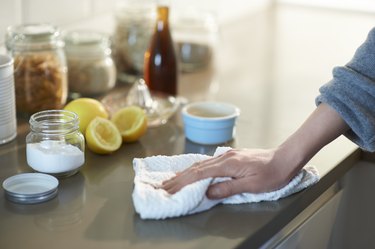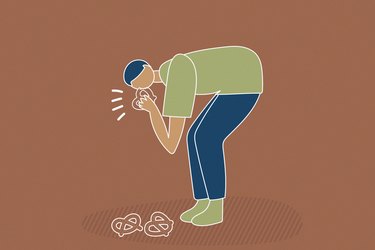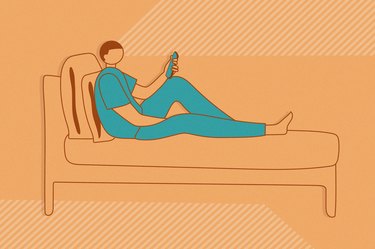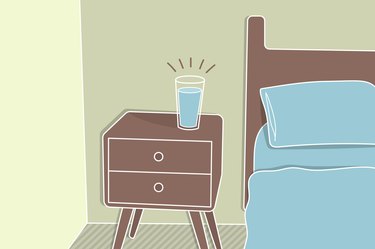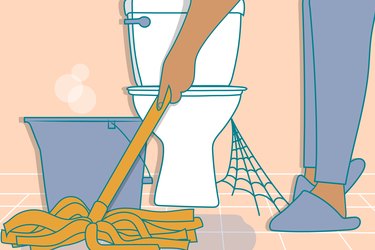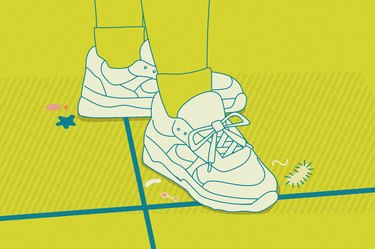
Most people have pretty strong opinions about wearing shoes at home. If you're a part of Team Shoes-On, you might think foregoing footwear indoors is uncomfortable or even inconvenient. But there's a good chance you'll change your mind when you find out what you're actually tracking onto your floors.
What Happens When You Wear Outdoor Shoes in Your Home
Even if you don't step in actual dirt (or worse, dog poop), your shoes pick up a lot of gunk when you're walking outside. "Several studies have suggested that shoes are vectors for infectious diseases," says Kishor Gangani, MD, MPH, an internist at Texas Health Arlington Memorial Hospital.
Video of the Day
In other words? They're total germ magnets.
We're talking nasties like E. coli, which can cause stomach cramps, diarrhea, and vomiting. In a May 2008 study sponsored by the not-for-profit Cleaning Industry Research Institute (CIRI), 96 percent of participants had measurable levels of the bacteria on their shoes within two weeks. (And the shoes were brand-new at the study's outset.)
Our shoes are also regularly bringing in the bacteria Clostridium difficile or C. diff. In fact, the bacteria is more likely to show up on shoe bottoms than on toilet seats, according to June 2014 findings published in the journal Anaerobe. C. diff can cause diarrhea or fever in healthy people, notes the Centers for Disease Control and Prevention (CDC). In older adults or those with compromised immune system, a C. diff infection can be deadly.
And when you wear your bacteria-covered clodhoppers around your home, almost all of the microbes on your shoe soles come along for the ride. The CIRI study found that when people wore their street shoes inside, a whopping 90 to 99 percent of germs on the shoes were transferred to the floor tiles. From there, they might get picked up by a crawling baby or toddler, a pet or by objects that fall onto the floor. The germs can even end up on your own feet once you do finally take your shoes off.
Frequent cleaning might not make much difference either, since some of these microbes are tough to get rid of. "As Clostridium difficile spores are resistant to disinfection, the possibility of community household contamination is high," Dr. Gangani says.
The Alternatives
You can corral the germs on your footwear by removing your shoes at the door and placing them in a dedicated bin or shoe rack. From there, it's just a matter of deciding whether you want to go barefoot or wear shoes that are just for inside.
Going totally shoe-free at home is often the best bet.
"Being barefoot is great for overall foot health and helps to increase foot muscle strength, tissue tolerance and joint mobility," says Alissa Kuizinas, DPM, a board-certified podiatrist in Concord, Massachusetts. Try taking a gradual approach if walking around barefoot is uncomfortable because you're not used to it. "Go for 15 to 30 minutes a day and work up from there," she says.
If you have foot pain, flat feet, or ankle arthritis, consider having a pair of supportive slippers or shoes that stay in the house. Shoes should have flat, flexible soles, a wide toe box and low or minimal cushioning, Dr. Kuizinas says. "If you require a slipper, I would recommend a stiffer sole, possibly a forefoot rocker or toe spring, and some cushioning," she adds.
Indoor shoes may also be safer for older adults, since non-skid soles can reduce the risk for falls, according to the National Institute on Aging. People with diabetes or neuropathy should always wear shoes indoors too, to avoid foot injuries that could become infected.
So, How Bad Is It Really to Wear Your Street Shoes at Home?
There's a really, really high chance that wearing your street shoes inside will track germs into your home that could potentially cause illness. That's especially true if you have a baby, toddler or young child who spends a lot of time crawling or playing on the floor, or if you live with someone who's immunocompromised.
Dr. Gangani puts it pretty plainly: "Wearing outdoor shoes inside the house should be avoided."
- Anaerobe: "Investigation of potentially pathogenic Clostridium difficile contamination in household environs"
- Centers for Disease Control and Prevention: "What is C. diff?"
- National Institute on Aging: "Falls and Fractures in Older Adults: Causes and Prevention"
- Cleaning Industry Research Institute: "Study Reveals High Bacteria Levels on Footwear"
Is this an emergency? If you are experiencing serious medical symptoms, please see the National Library of Medicine’s list of signs you need emergency medical attention or call 911.


